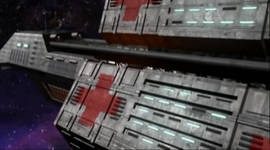ChrisReid
Super Soaker Collector / Administrator

On this day in the year 2634, war is formally declared between the Terran Confederation and Empire of Kilrah. The last straw came in the form of the tragic Anna Magdelena incident. See how descriptions of this event vary slightly over time. The quotes below come from Claw Marks, Victory Streak and Kilrathi Saga/Star*Soldier.
On 2634.186, war is formally declared by the Terran Confederation on the Empire of
Kilrah for countless acts of piracy and unwarranted assault.
The Anna Magdelena, ferrying orphans to Dieno, is attacked by a pair of Kilrathi fighters. All hands are lost. In retaliation for this and the five-year string of equally heinous abuses of all known laws of civility, the Terran Confederation officially declares war on the Empire of Kilrah for countless acts of piracy and unwarranted assault.
The Anna Magdelena, a refitted transport ship ferrying orphans to their new homes on Dieno, is openly attacked by a pair of Kilrathi fighters. No one survives. In retaliation for this and the five-year string of equally heinous abuses of all known laws of civility, the Terran Confederation officially declares war on the Empire of Kilrah.
--
Original update published on July 5, 2010
Last edited by a moderator:


 That kind of thing wasn't unheard of from the Japanese. It also helps convey that the Kilrathi aren't just humans wearing funny kitty suits, but have their own morality and code of conduct (so to speak).
That kind of thing wasn't unheard of from the Japanese. It also helps convey that the Kilrathi aren't just humans wearing funny kitty suits, but have their own morality and code of conduct (so to speak).
 .
.